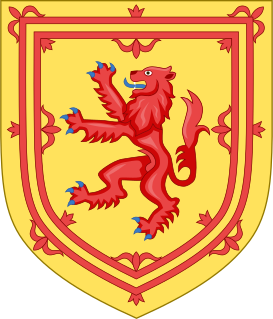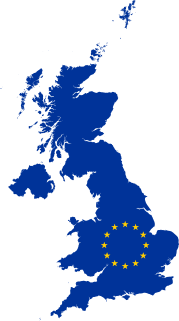
The European Communities Act 1972, also known as the ECA 1972, was an Act of the Parliament of the United Kingdom which made legal provision for the accession of the United Kingdom to the three European Communities – the European Economic Community, European Atomic Energy Community (Euratom), and the European Coal and Steel Community ; the EEC and ECSC subsequently became the European Union. The Act also incorporated Community Law into the domestic law of the United Kingdom and its acquis communautaire, its treaties, regulations and directives, together with judgments of the European Court of Justice, and the Community Customs Union, the Common Agricultural Policy (CAP) and the Common Fisheries Policy (FCP).

Brexit was the withdrawal of the United Kingdom (UK) from the European Union (EU) at 23:00 GMT on 31 January 2020. The UK is the only sovereign country to have left the EU. The UK had been a member state of the union and its predecessor the European Communities (EC) since 1 January 1973. Following Brexit, EU law and the Court of Justice of the European Union no longer have primacy over British laws, except in select areas in relation to Northern Ireland. The European Union (Withdrawal) Act 2018 retains relevant EU law as domestic law, which the UK can now amend or repeal. Under the terms of the Brexit withdrawal agreement, Northern Ireland continues to participate in the European Single Market in relation to goods, and to be a de facto member of the EU Customs Union.

The Scottish Government has proposed holding a second referendum on Scottish independence from the United Kingdom (UK). A first referendum on independence was held in September 2014, with 55% voting "No" to independence. Ahead of that referendum, the Scottish Government stated in its white paper proposing independence that voting Yes was a "once in a generation opportunity to follow a different path, and choose a new and better direction for our nation".

On 29 March 2017, the United Kingdom (UK) invoked Article 50 of the Treaty on European Union (TEU) which began the member state's withdrawal, commonly known as Brexit, from the European Union (EU). In compliance with the TEU, the UK gave formal notice to the European Council of its intention to withdraw from the EU to allow withdrawal negotiations to begin.

The European Union (Withdrawal) Act 2018 is an Act of the Parliament of the United Kingdom that provides both for repeal of the European Communities Act 1972, and for parliamentary approval to be required for any withdrawal agreement negotiated between the Government of the United Kingdom and the European Union. The bill's passage through both Houses of Parliament was completed on 20 June 2018 and it became law by Royal Assent on 26 June.

Between 2017 and 2019, representatives of the United Kingdom and the European Union negotiated the terms for Brexit, the planned withdrawal of the UK from the EU. These negotiations arose following the decision of the Parliament of the United Kingdom to invoke Article 50 of the Treaty on European Union, following the UK's EU membership referendum on 23 June 2016.

The United Kingdom (UK) was a member of the European Economic Area (EEA) from 1 January 1994 to 31 December 2020, following the coming into force of the 1992 EEA Agreement. Membership of the EEA is a consequence of membership of the European Union (EU). The UK ceased to be a Contracting Party to the EEA Agreement after its withdrawal from the EU on 31 January 2020, as it was a member of the EEA by virtue of its EU membership, but retained EEA rights during the Brexit transition period, based on Article 126 of the withdrawal agreement between the EU and the UK. During the transition period, which ended on 31 December 2020, the UK and EU negotiated their future relationship.

The European Union Act 2020 is an act of the Parliament of the United Kingdom that makes legal provision for ratifying the Brexit Withdrawal Agreement and incorporating it into the domestic law of the United Kingdom. It is the most significant constitutional piece of legislation to be passed by Parliament of the Second Johnson ministry. The Withdrawal Agreement was the result of Brexit negotiations.

The impact of Brexit on the Irish border and its adjacent polities involves changes in trade, customs, immigration checks, local economies, services, recognition of qualifications, medical cooperation, and other matters, now that it is the only external EU land border between the United Kingdom and the European Union.

The Brexit withdrawal agreement, officially titled Agreement on the withdrawal of the United Kingdom of Great Britain and Northern Ireland from the European Union and the European Atomic Energy Community, is a treaty between the European Union (EU), Euratom, and the United Kingdom (UK), signed on 24 January 2020, setting the terms of the withdrawal of the UK from the EU and Euratom. The text of the treaty was published on 17 October 2019, and is a renegotiated version of an agreement published half a year earlier. The earlier version of the withdrawal agreement was rejected by the House of Commons on three occasions, leading to the resignation of Theresa May as prime minister and the appointment Boris Johnson as the new prime minister on 24 July 2019.
The Irish backstop was a proposed protocol to a draft Brexit withdrawal agreement that never came into force. It was developed by the May government and the European Commission in December 2017 and finalised in November 2018, that aimed to prevent an evident border between the Republic of Ireland and Northern Ireland after Brexit.

Brexit negotiations in 2018 took place between the United Kingdom and the European Union for the withdrawal of the United Kingdom from the European Union following the United Kingdom European Union membership referendum on 23 June 2016. The negotiating period began on 29 March 2017 when the United Kingdom served the withdrawal notice under Article 50 of the Treaty on European Union. The period for negotiation stated in Article 50 is two years from notification, unless an extension is agreed. In March 2019, British prime minister Theresa May and European leaders negotiated a two-week delay for the Parliament of the United Kingdom to agree on the government's Brexit treaty, moving the date from 29 March 2019 to 12 April 2019. Negotiations between the United Kingdom and the European Union regarding Brexit began in June 2017, with the following negotiations taking place during 2018.
Below is a timeline of major events concerning Brexit: from the referendum until Brexit day on 31 January 2020, and from Brexit day until 1 January 2021.

The Protocol on Ireland/Northern Ireland, commonly abbreviated to the Northern Ireland Protocol, is a protocol to the Brexit withdrawal agreement that governs the unique customs and immigration issues at the border in the island of Ireland between the United Kingdom of Great Britain and Northern Ireland and the European Union, and on some aspects of trade in goods between Northern Ireland and the rest of the United Kingdom. Its terms were negotiated in 2019 before the UK general election, and concluded in December of that year. The withdrawal agreement as a whole, including the protocol, was ratified in January 2020. The UK-Ireland border has had a special status since the thirty-year internecine conflict in Northern Ireland was ended by the Good Friday Agreement of 1998. As part of the Northern Ireland Peace Process, the border has been largely invisible, without any physical barrier or custom checks on its many crossing points; this arrangement was made possible by both countries' common membership of both the EU's Single Market and Customs Union and of their Common Travel Area.

This article outlines the delivered and predicted impact of Brexit, the withdrawal of the United Kingdom (UK) from the European Union (EU) and the European Atomic Energy Community.
In the wake of the referendum held in the United Kingdom on 23 June 2016, many new pieces of Brexit-related jargon entered popular use.
The United Kingdom Common Frameworks are a group of legislative and non- legislative policies that aim to create UK wide frameworks and ensure the security and integrity of the UK internal market.

The United Kingdom Internal Market Act 2020 is an act of the Parliament of the United Kingdom passed in December 2020. It is concerned with trade within the UK, as the UK is no longer subject to EU regulations. The act seeks to prevent internal trade barriers among the four constituent countries of the United Kingdom, and to restrict the way that certain legislative powers of the devolved administrations can operate in practice.
The Repeal Bill plan, officially known as Legislating for the United Kingdom’s withdrawal from the European Union , was a UK Government white paper setting out the Governments proposals for repealing the European Communities Act 1972 and how to maintain a fully functioning statute book after the United Kingdom had left the European Union. It was published on 30 March 2017 (the day after the UK triggered Article 50 by the Department for Exiting the European Union.

The Northern Ireland Protocol Bill is a proposed Act of the Parliament of the United Kingdom that seeks to unilaterally over-ride parts of Northern Ireland Protocol, which is that part of the Brexit withdrawal agreement that governs some aspects of trade in goods between Northern Ireland and Great Britain. The bill was introduced to address what the government call 'unacceptable barriers to trade' that the protocol introduced within the UK. The bill has been criticised by most members of the Northern Ireland Assembly and by the Commission and members of the European Union. It has been characterised in the UK as a breach of international law.







